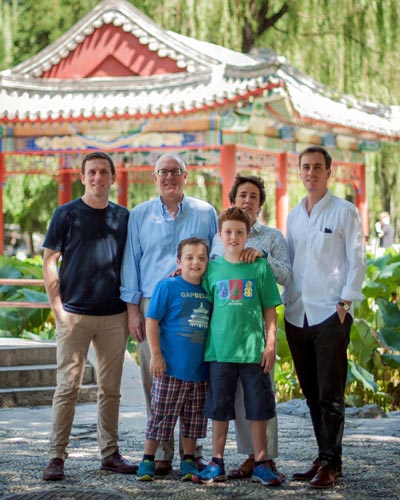A Western diplomat's 'phenomenal' China story

Carl Worker's close involvement with China stretches across three decades-almost as long as his diplomatic career.
The outgoing New Zealand ambassador to China joined his country's diplomatic corps after college in 1980, and spent the next year in Canberra, where he says, he first "dipped my toe in the world of Asian things" working in the Asian department.
After he returned to Wellington from Australia in 1980, he went for intensive Mandarin lessons, first at the London University's School of Oriental and African Studies, and then for another year at a language school in Hong Kong.
"What I discovered through the language training, even before I got to Beijing, was that I had been given the key to a marvelous world. The world of China and Chinese civilization and Chinese culture and the enormity of China's modern quest to bring itself up to be second to none in the world."
He came to Beijing for his first term in the country, as second secretary (political), from 1984 to 1986. He says that with only three New Zealand diplomats in Beijing at the time, his job involved much more work than the title suggested.
"It was absolutely fantastic," Worker says. "I used to do education, culture, science, politics-all people-to-people things."
Previous Page 1 2 3 Next Page
Worker returned to Beijing as deputy head of mission from 1992 to 1994, then served as New Zealand's consul general to Hong Kong through 1998, and came back to Beijing in 2009 as his country's ambassador.
He says the changes he has witnessed over the past 30 years, politically, economically and personally are so huge that they can be hard to fully convey.
"China, when I first came here, was a place that was enormously inward-looking and it was very, very poor," Worker says.
"And, it was very suspicious of the outside world. It wasn't easy to have relationships with any degree of naturalness."
He says that, up until the 1980s, there was a strong sense that "China knew best about everything and that the world would do well to listen to China".
One of the biggest changes that started in the 1970s and which he says he saw becoming real in the '80s, was that China realized it could learn from other countries, "without giving up what makes China special".
"China has achieved enormous progress. It's phenomenal. It's lifted more people out of poverty in a shorter time than has ever happened. The scale and rapidity of it is phenomenal."
China is also an important part of Worker's family life. He has two adult sons, one of whom lives and works in Beijing and will remain after his father departs, as well as two younger boys who attended school in the city.
"We really like going walking around famous Chinese historical sites," he says, where he and his wife, Connie Aldao-Worker soak up China's history and there is always plenty of space for the boys to run around.
Connie is a professional chef and restaurateur and the family all love Chinese food. Their favorite family restaurant is Yiheyaju at the northeast corner of Beijing's Ritan Park, he says.
Worker's term as ambassador ends on Friday and the family will return to New Zealand on Monday, but he will continue to be involved in China relations for the foresee-able future, based in his country's business metropolis of Auckland. He says he will assist the development of business ties between New Zealand and China.
Many New Zealanders still don't know as much about China as they need to fully take advantage of all the opportunities here, and his new role will be to offer advice and help businesses and agencies develop Chinese strategies, Worker adds.
China, he says, has made enormous efforts to educate itself on how the West does things, but the West has been slower about doing the same thing in relation to Asia and China.
Asked for an example of how the business cultures of the two countries differ, he says that business leaders in New Zealand and many Western countries are often judged on how well they delegate, while in China, leadership is a critical part of success and leaders still do a lot of tasks themselves.
"Here, things get led from the top."

 Print
Print Top 10 topics of international talents in 2018
Top 10 topics of international talents in 2018 Policies to attract foreign talent
Policies to attract foreign talent


